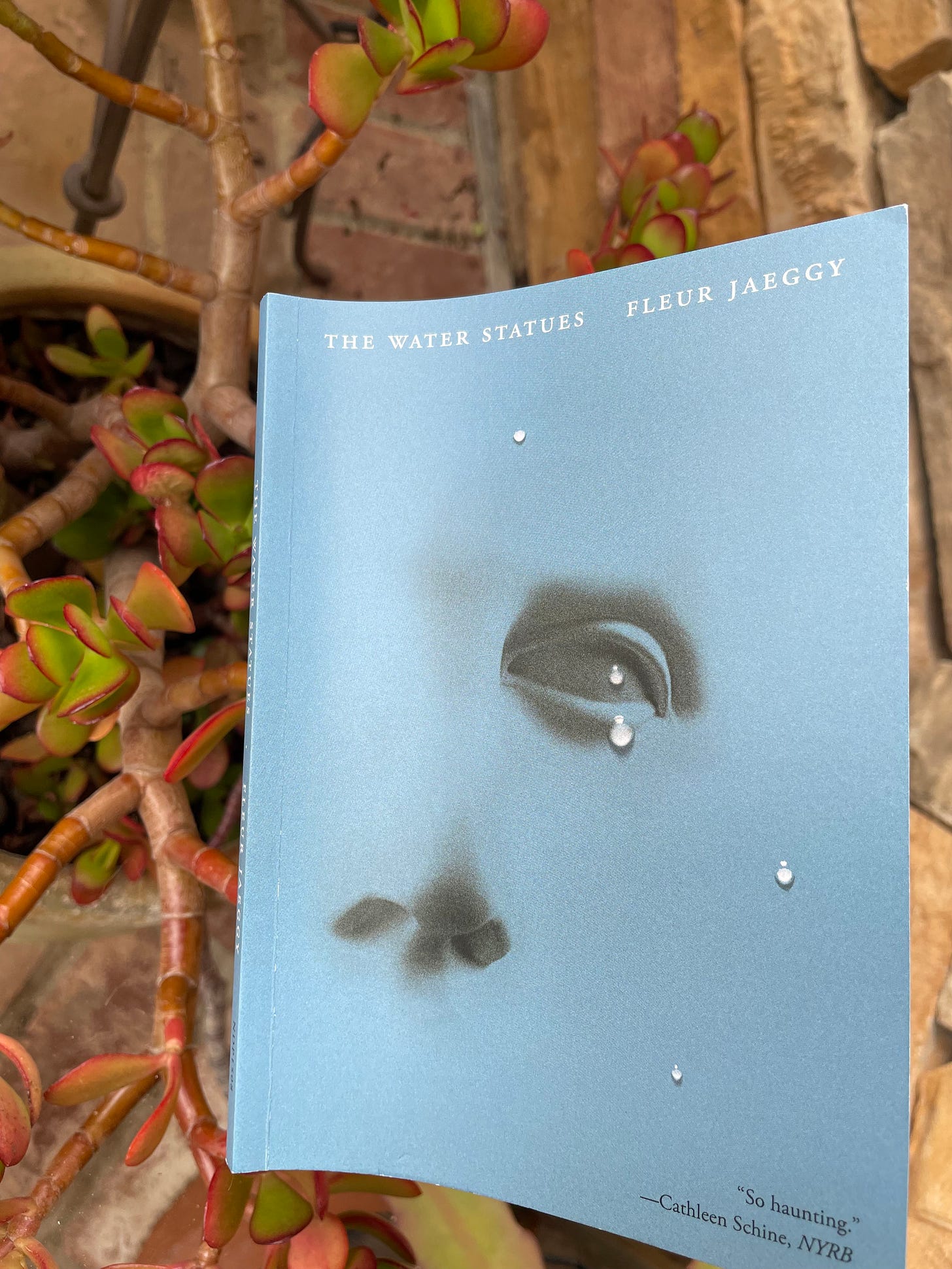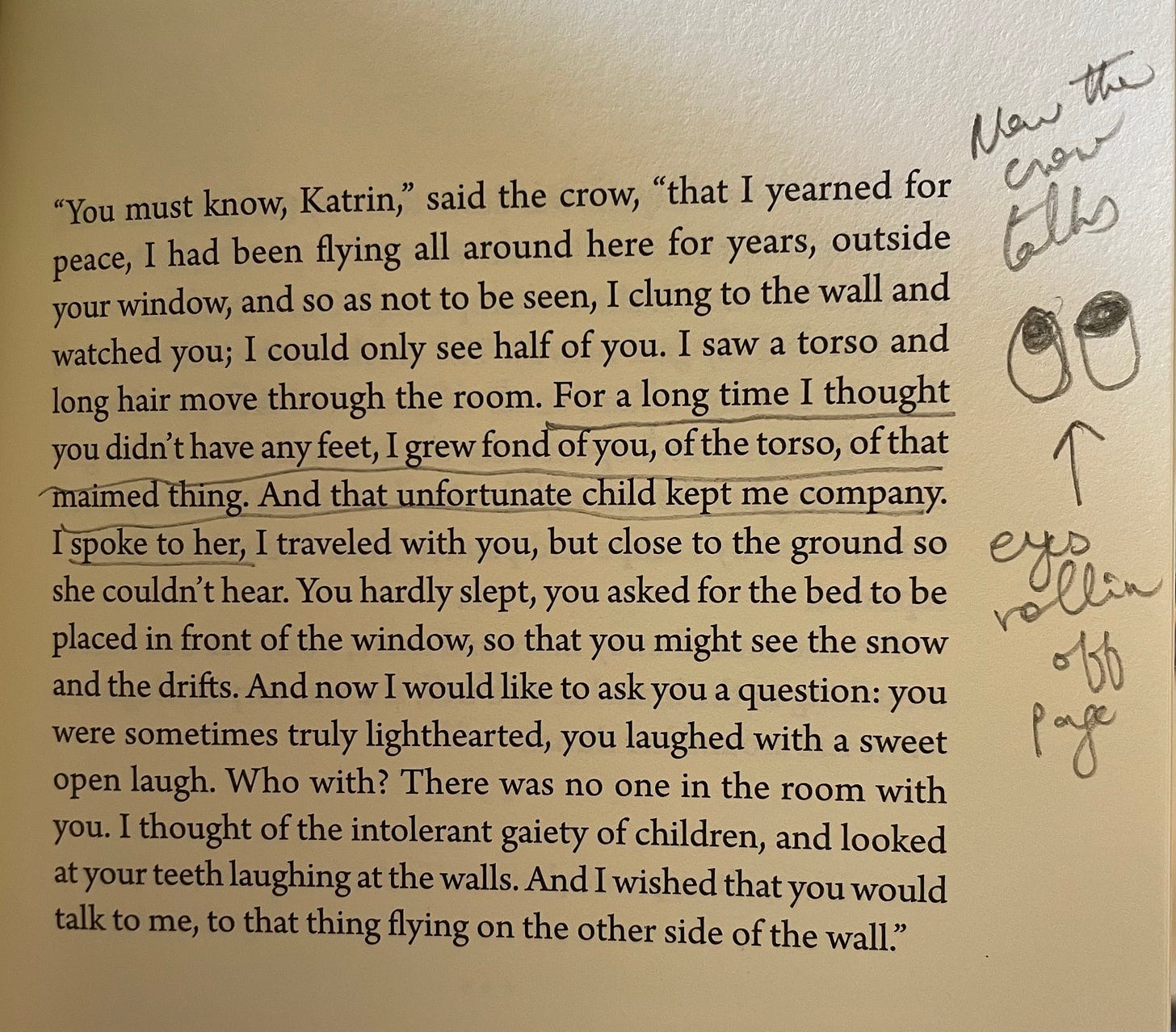DOES ANYONE WANT THE WATER STATUES?
A book I did not understand is outside my front door, right by my jade plant. Take it, please.

Once in a while I learn that I bought a book without judging the cover or the contents of the first page. The Water Statues by Fleur Jaeggy was first published in 1980, and four decades later, in 2021, Gini Alhadeff translated it from the Italian.
Everyone does not need to like everything. There’s a reason a creative work is out there in the world. A literary agent and a publisher saw value in a book, and a translator—whose bio makes me want to read her memoir instead—also found meaning in the work. So who am I to pass judgement on a creative soul when I’m, after all, just a bedbug in the universe, as my father, Daddykins, was wont to say about his own place on this earth? Bedbugs bite, however. They leave swollen red spots in their wake that often itch.
All I wish to say is that writers, however accomplished, need to remember that their work ought to make sense for those who give their work the gift of their time.
The Water Statues gave me whiplash. The frequent first person to third person switches were jarring. While a reader must meet a writer half way during the reading experience, when a reader is having to do all the work of trying to make sense of a book page after page, it’s obvious that the writer had some more work to do in order to fine-tune the story for ordinary mortals. If a cryptic work demands a certain quality of intellect that I do not (yet) possess, I know I have two options: One, get back to kindergarten and work my way up all over again which I do not intend to do; two, stay away from writers who are working in an extra-terrestrial medium whose frequencies I don’t hear.

A while ago, I read a book in Arabic called The Blind Owl that felt as oppressive as the 109 degree California heat last September. The narrator in the story was almost always on an opium high and I could not bear to read a book with such an unreliable narrator.
In contrast, in The Water Statues, there are a parade of unreliable narrators who clearly have another problem. They are dead, or dying, or watching over the dying, or they are stone statues in a flooded basement, or they are crows. Given that they were out in the stratosphere where I could not perceive the pathos of their human condition, with every page, I found it harder to relate to the characters.
The Water Statues tells the tale of the relatives, valets and friends of a gentleman called called Beeklam, a wealthy recluse who keeps statues in his villa’s flooded basement in Amsterdam, “where memories shiver in uncertain light and the waters run off to the sea.”
“Yet father and son kept each other company well; they seldom spoke of what was between them, so distant and fragrant, of the wife and mother, who had “simply passed before us through the door that leads into the world of light where all is radiant, and where one day we’ll be reunited in a bond of ineffable beatitude still beyond our grasp.” My father Reginald enjoyed speaking like this.
There are many powerful reflections in this book on relationships, life and death or the place in between where our bodies are believed to hover. The novella is packed with poignant passages on loneliness and old age.
The son racked his brains to find a subject that wouldn’t be dangerous, that would spare Reginald fresh proof of his innate cruelty and of his innocent, clueless inhumanity; and Beeklam gingerly traveled the paths of conversation, like a lady who walks along a muddy path holding up her skirts.
I marked up several terrific passages with the words “Brilliant” and “Wow”. Unfortunately, there is a little more marginalia that reads like “???” or “Come on🙄”. One such moment is captured below.
Fleur Jaeggy writes spellbinding sentences. Those alone are not enough, unfortunately. Those discrete pebbles of thought need to congeal into one rolling mass that then ought to roll to a point that the reader much reach. In The Water Statues I felt I was always in over my head in a flooded basement. I didn’t even have a valet to rescue me and transport me to dry land.




So funny to think of you abandoning that orphan book on your doorstep, hoping that somebody will take it away for you!
This brings up that all-important moral question: When is it OK to abandon a book? It feels like abandoning a child in some ways. You don’t hang around and watch it grow, see it to adulthood. I rarely quit on one, until I reach a “throw it at the wall” moment of annoyance. But you sifted the rubble beneath those waterlogged statues for a few gold nuggets. I admire you perseverance! I’m reading Barbara Kingsolver’s Demon Copperhead right now. Amazing character creation and dialect work! You deserve a week off to read something actually good.